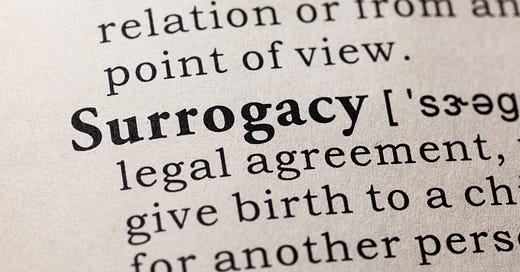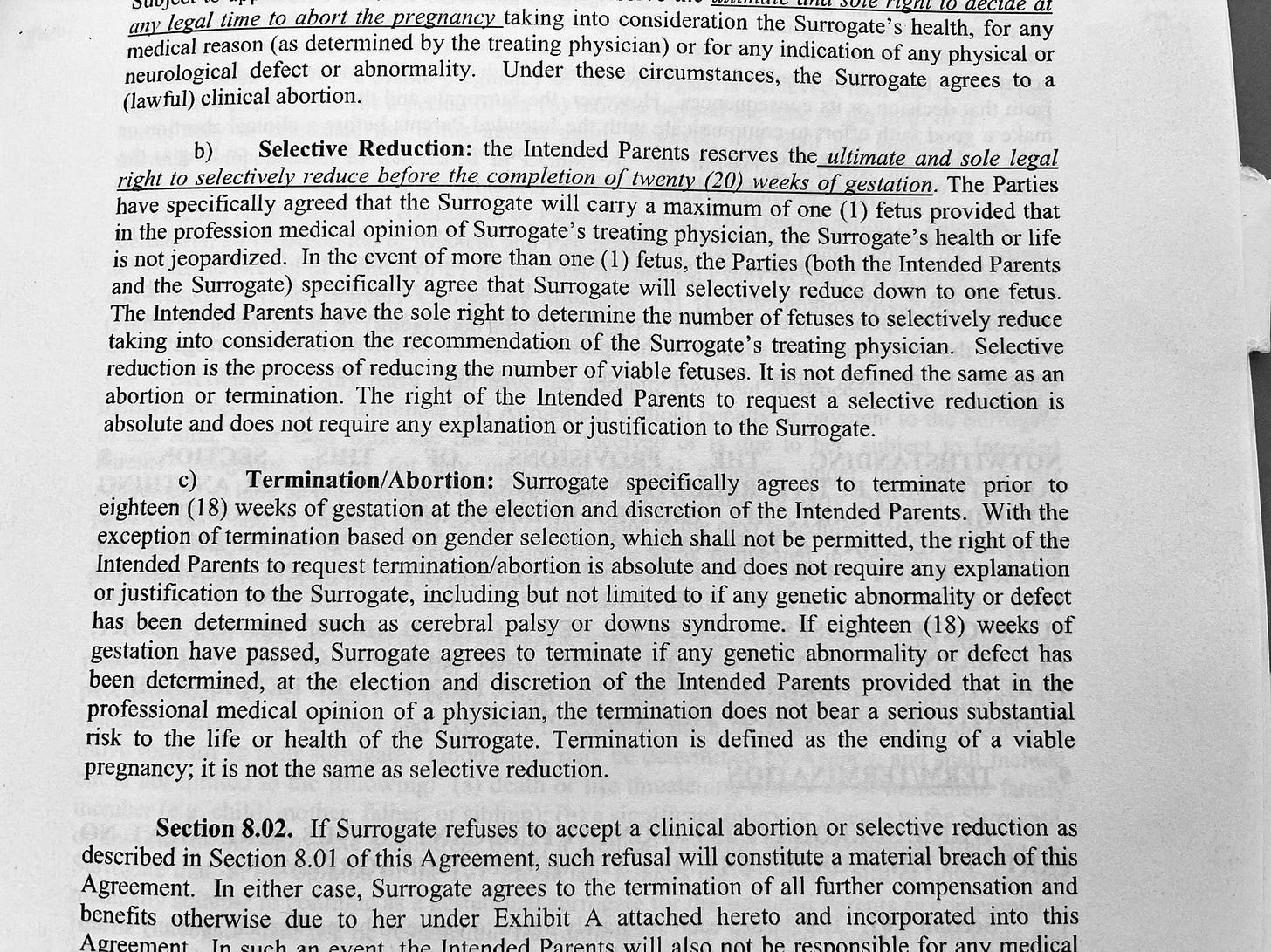It’s pretty universally understood that if you want to buy a puppy, you’re going to have to wait until it’s about 8 weeks old.
To separate a puppy from its mother before this point carries tremendous risks, not only nutritionally, but behaviorally. Puppies that are separated too early are much more likely to display problems in behavior and temperament when they’re older. They often have shorter life expectancies and are prone to be nervous with a tendency to bark and bite.
We know this, and we respond accordingly when it comes to puppies. But human babies aren’t granted these same basic dignities. Children born through surrogacy are ripped cruelly out of the arms of the only mother they’ve ever known- the single person with whom they’ve chemically bonded for almost a year- and they’re placed in the arms of the highest bidder without a second thought to their own basic primal needs as humans.
Studies show that maternal separation is a major physiological stressor for the infant, and even brief maternal deprivation can permanently alter the structure of the infant brain. This is well studied and acknowledged in to context of adoption, but for some reason, we collectively seem to ignore this when it comes to surrogacy.
I think a lot of Christians get this wrong. The question is why. Why don’t we care more about this?
Here, in a nutshell, are a number of additional reasons I think surrogacy is incompatible with both a Christian, pro-life and a feminist ethic:
It commodifies women’s bodies in a world where women are already dehumanized and objectified too often. The European Parliament in Brussels has concluded that “surrogacy undermines the human dignity of the woman since her body and its reproductive functions are used as a commodity,” and its resolution goes so far as to call surrogacy “an act of violence against women.” Even impoverished nations such as India have recently banned commercial surrogacy — a $3.3 billion annual revenue source — outright. If a poor country is willing to sacrifice $3.3 billion a year to protect women from the exploitation of commercial surrogacy, what’s our excuse?
One of the things that appeals to me most about first-wave feminism is the dogged commitment to empowering women to be seen and treated as more than sex objects or breeders. Now, in the name of compassion, we are going 180 degrees in the opposite direction. In the last month alone, I’ve seen countless headlines referring to surrogate mothers as “gestational carriers,” “a greenhouse for my seed,” and “incubators.” One gay man wrote, “What do I need women for — until I want to have kids?”
Commercial surrogacy is dehumanizing enough in theory and even more so in practice. Has anyone else noticed that the only people hiring surrogates are the wealthy or that the women they’re hiring are usually poor and desperate for money? As Jennifer Lahl, president of the Center for Bioethics and Culture, poignantly asked, “As Kim Kardashian and Kanye West welcome a new baby through surrogacy, I ask you: How many times have you seen a People Magazine cover tabloid where a wealthy celebrity is offering to be a surrogate for her low-income housekeeper?”
How meaningful is anyone’s consent when it’s born of desperation?
It’s been a mistake to allow the conversation around surrogacy to be framed as a gay rights issue instead of a matter of basic human dignity for women. No one has a right to anyone else’s body or child.It’s the literal selling of humans to the highest bidder. There’s no way around this inconvenient reality. Rich people buy. Poor people sell, and no one gives any thought to the implications for the babies. And the horror stories aren’t hard to find. From the Japanese millionaire who’s already bought 13 babies to raise without mothers to the 24 year-old Russian woman who is well on her way to her goal of adopting 105 surrogate babies, there seem to be no limits to what money can buy at the babies’ expense. Across the globe, surrogacy is a pipeline for human trafficking. Is anyone really paying attention to what happens to these babies or who purchases them?
One former surrogate learned this lesson the hard way. “When the FBI came, they said the gold bars I received from the intended parents were possibly connected with human trafficking, and the gold I received was basically currency for humans,” she recalled in a recent interview.It’s dangerous. According to research compiled by the Center for Bioethics and Culture Network, surrogate pregnancies are pretty much always high risk to both mother and child. Studies show that women pregnant with donor eggs, very common in surrogate pregnancies (the definition of gestational surrogacy), have a more than three-fold risk of developing pregnancy induced hypertension and pre-eclampsia. Children born through surrogacy are much more likely to suffer from low and very low birth weights. In addition, a 2014 study from the Journal of Perinatology found a 4-5 fold increase in stillbirths from pregnancies through assisted reproductive technologies.
Due to the high costs involved in surrogacy and the strong desire to boost success rates, multiple embryos are often transferred into the surrogate mother. In addition to the increased risk of caesarian sections and longer hospital stays, the British Journal of Medicine warns, “Multiple pregnancies are associated with maternal and perinatal complications such as gestational diabetes, fetal growth restriction, and pre-eclampsia as well as premature birth.”
Women are dying from these pregnancies, but the mainstream media will never report on this.Nearly every surrogacy contract on the planet requires the surrogate to agree to abortion pending the intended parents’ demand for it. This alone ought to be enough to give Christians substantial pause.
Selective reduction and termination happen more often than people seem to realize. For one thing, multiple embryos are often implanted in the surrogate’s womb for increased chances of viability, even when the intended parents only want one baby. If more than one embryo implants the surrogate is often required to abort surplus embryos.
For another thing, many parents only want the babies if they’re perfectly healthy. Embryos with any kind of abnormality from Down Syndrome to heart murmurs to dwarfism are often deemed undesirable and flagged for termination. One British surrogate was horrified to discover that the intended parents’ had no plans of following through and raising their daughter once they learned she was disabled. “I don’t want a dribbling cabbage for a daughter,” the mother declared.
Christians, especially ought to care about this angle. What happens to all the surplus embryos? What happens to the children deemed unwanted?It’s a violation of the child’s rights. Whenever humanly possible, children have a right to both their parents. They have a right to an identity. They have a right to know their origins, their nationality, their genetic health history. We shouldn't breed children with the intent of ripping them away from their birth mothers, who, for nine months, have served as the constant source of familiarity and comfort. There are many unspoken but well-studied emotional risks in doing this, seen often enough in children of adoption. But where adoption seeks to mend the wound of the rending, surrogacy sets out from the start with the specific intent to rend. Babies born of surrogacy also have increased risk of a litany of health problems.
Infertility has been around since the first book in the Bible. It’s an age old, very painful problem. But the new problem is that Christians aren't thinking rightly about the ethical implications of surrogacy. The harsh truth is that parenting is privilege, not a right, and even our deepest desires do not justify our choice to infringe on the rights of others. We must be content to live in a world where we don’t always get what we want, in this case the commodification of another woman’s body in order to intentionally inflict a primal wound on a child who deserves so much more.





Also, the process of extracting donor eggs from young, healthy women is brutal and risky.
So what about Abraham and Jacob, and all the other Bible men who had concubines?
Abraham used Hagar and then kicked her out, separating Ishmael from his father.
Jacob's wives kept giving their slaves to him for impregnation when they weren't able to have kids.The men would probably just have (causal) sex with the slaves because they're not wives and he's just using them. Do the wives have the right to claim the slaves children?
I doubt these concubines could object, since they were the wives' property. It's like incubation becomes part of her work as a slave, so she has to do it.
What do you think?